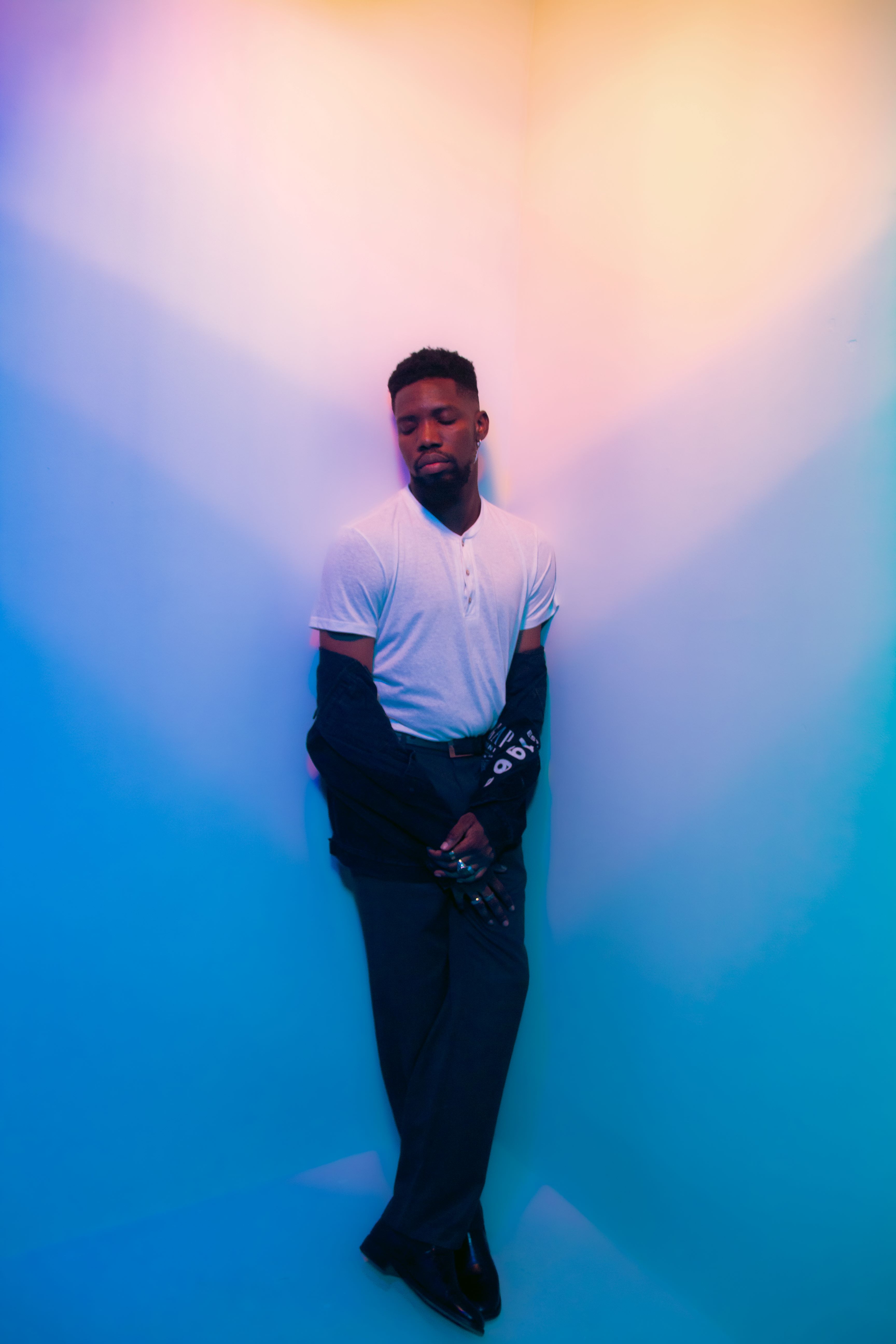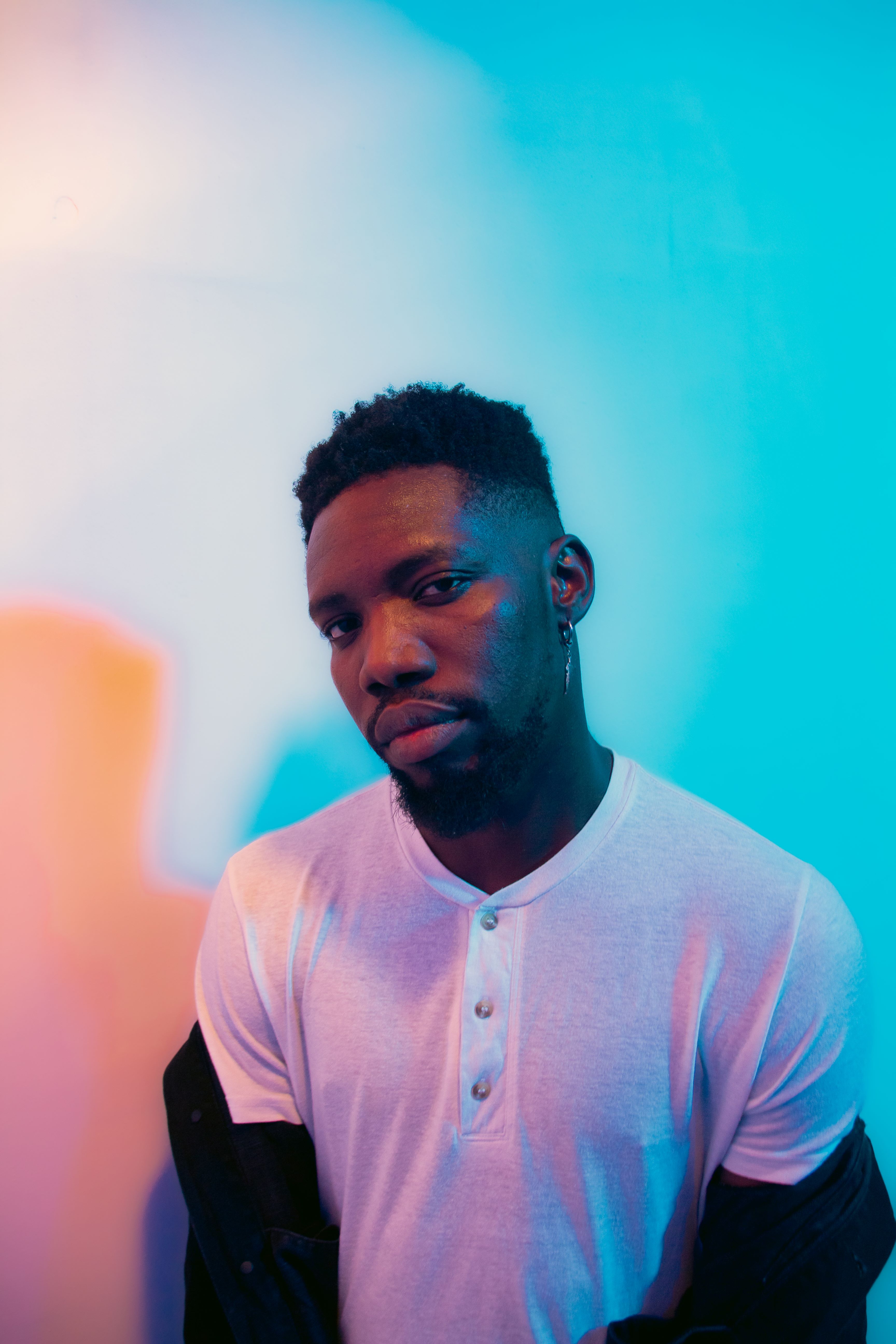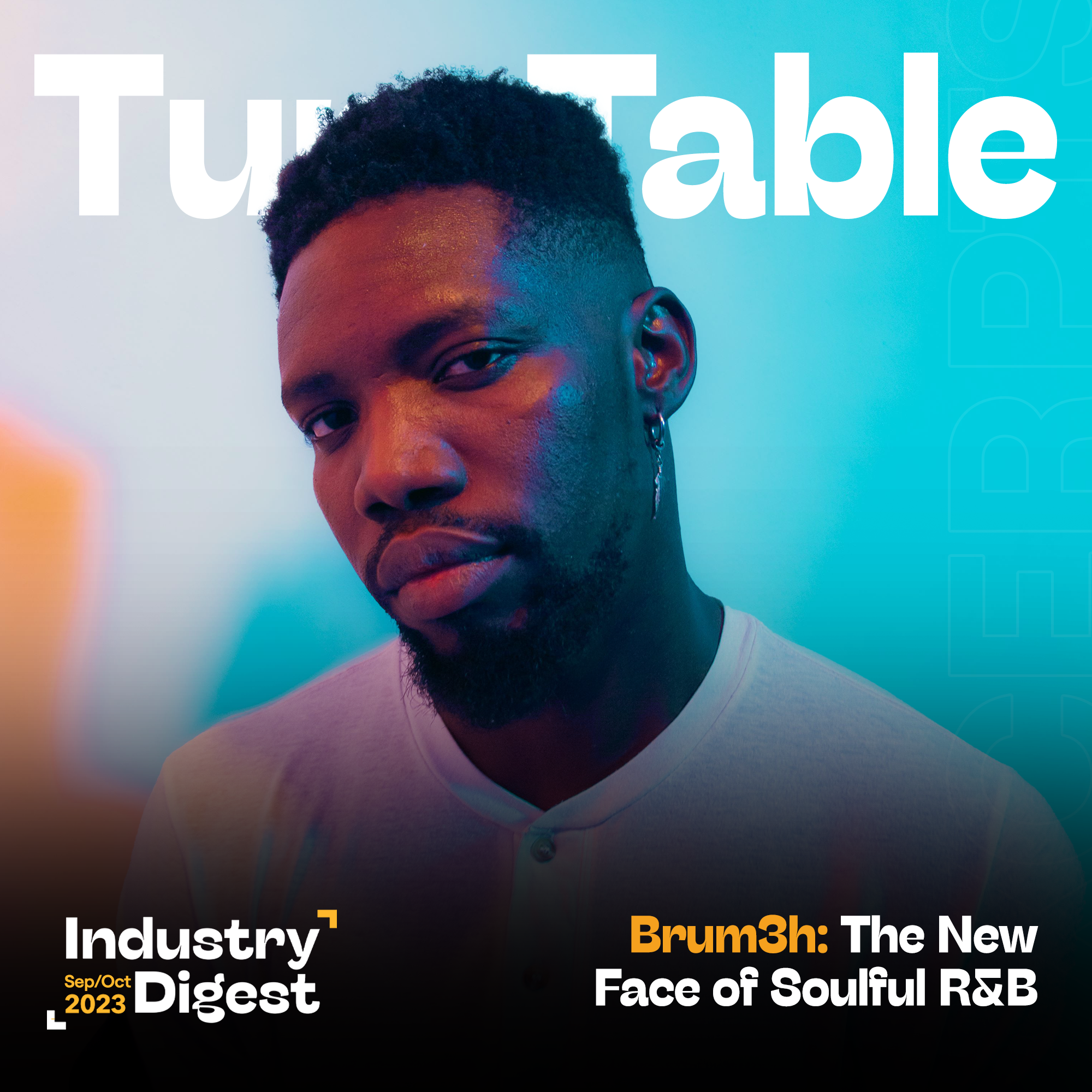Emerging Nigerian artist Brum3h has recently graced us with his long-awaited sophomore EP, "Typewriter Vol.1." This enchanting musical memoir is a poignant collection of personal experiences, emotions, and introspection that offers a profound look into the artist's soul."Typewriter Vol.1" is a profound musical diary, detailing Brum3h''s journey as he finds solace in his vulnerabilities. The project began with a simple act of song creation after his first project, "The Big Blue." These songs gradually took on a life of their own, coalescing into a common theme that encapsulated a specific period in his life—a set of experiences he needed to share with the world. Thus, "Typewriter Vol.1" was born. In this interview with TurnTable, BRUM3H talks about his “Typewriter Vol. 1’, his living room tour and future plans.
TTC: Congratulations on the release of your EP. How did you know this was the right situation for you?
Brum3h: First of all, thank you. This EP came together organically as I kept making songs that began to center around a specific theme. It naturally evolved into a collection of tracks that reflected a particular period in my life and the experiences I wanted to express.
TTC: You described "Typewriter Vol.1" as a musical memoir of your personal experiences and emotions. Can you tell us what inspired you to create this EP and share these intimate stories through music? Brum3h: Really these songs were all inspired by real life experiences. Actual conversations that happened and my music has always been from a place of "Oh I may not always be able to say this to the person in real life or in the moment". I may not be able to process what I'm feeling. Over time, as I start to process them, they just end up coming out as songs, that's really the inspiration or the driving force behind the songs on the EP.****
TTC: I love the yearning nature of the title. What are you pining after?
Brum3h: What are my pining after? In one word. Release. Resolution. Like I said, a lot of the time. I don't process things right then when they happen. And you know, just being a human being, you need to process things to be able to move on. So, writing the songs for me usually, is quite therapeutic, it's a cathartic process. By the time I get to the end of a song more often than not I have come to terms with whatever the situation is that led me to writing said song, or at least that particular aspect of the situation. So that's it. In one word, Release.
TTC: "Nightslikethis" opens the EP with a beautifully soulful, falsetto-driven melody that carries a sense of longing and regret. Can you take us through the emotional journey of creating this track and how you channeled your soul into it?
Brum3h: Writing "Nightslikethis" was a challenging yet cathartic experience. I initially created the beat without a clear vision during lockdown. After adding harmonies and collaborating with Cybertiger for additional elements, I began to piece together the song's meaning. . I'm a human being and sometimes I'll make mistakes. Letting go of the person I made the song about felt like a mistake at the time. It was difficult to admit my mistakes, but the regret I felt became the driving force behind this emotional track.

TTC: In "Theysaid," you explore themes of self-sabotage and complex relationships. Can you elaborate on the message you're trying to convey in this track and the significance of collaborating with rapper Array?
Brum3h: With “Theysaid,” I aimed to convey a simple yet vital message: “Speak Up.” As humans, we rely on connections and sharing, but I used to bottle up my feelings, often failing to speak my mind. This self-destructive pattern inspired “Theysaid.” I chose to feature Array. I had discovered his music the year before when I saw him perform at an art exhibition and I went to listen to some of the stuff he put on Soundcloud. I realized that he was a very introspective rapper. His emotional depth aligned with the message, making him the perfect collaborator.
TTC: I think of the lyric “They said I need to face my reality and change my mentality” as one of the most vexed moments on the EP. Where were you when you wrote that one?
Brum3h: Writing "face my reality, change my mentality" came from a place of anger. Self-destructive behavior was a coping mechanism tied to past experiences. Admitting these issues and questioning their roots was tough. I felt anger towards myself and those who didn't understand my struggles.
TTC: What has been your resolve to the line?
Brum3h: In one phrase, "Speak up". And sometimes, listen to yourself, especially if one part of your head agrees with the advice your closest friends are giving you.
TTC: "Settle Down" seems to touch on relationship doubts and trust issues. Could you tell us more about the inspiration behind this song and how it fits into the overall narrative of the EP?
Brum3h: "Settle Down" delves into the uncertainties between two people due to their complicated pasts. Settle down is a song about two people who met each other in these "streets". It's about their journey from a casual encounter to a deeper connection. While I was ready to commit, her actions didn't align. Trust issues arose from our complex histories, making it hard to express my feelings in person. This song, like others on the EP, explores emotions I couldn't convey at the time.
TTC: "For Long" is a piano-driven ballad that warns of emotional unavailability. What motivated you to create this particular track, and how does it contribute to the EP's storyline?
Brum3h: "For Long" is tied to the emotions in "Nightslikethis," but it precedes those events. After a painful heartbreak, I was in a casual, non-committal phase. I met the person I sing about in "Nightslikethis," but she wanted commitment, which I couldn't provide at the time. I later regretted this, as you'll discover in "Nightslikethis." It explores the theme of impermanence and my inability to commit.
TTC: What’s your definition of love and how do you put it into practice everyday?
Brum3h: Love, to me, means consideration, sacrifice, and making space for mistakes. It's forgiving in advance and understanding that people won't always meet expectations. Love is patience, selflessness, and deliberate choice, even in challenging moments. It's about vulnerability and trust, believing others won't intentionally hurt you during your weakest times. I practice these values with friends, family, and partners. That sums it up.
TTC: "Two Blue Nikes" gives insight into the root of the trust issues mentioned in the previous track. Could you expand on the connection between these two songs and what listeners can expect from "Two blue Nikes"?
Brum3h: “Two Blue Nikes” is about the frustration of being unheard, despite speaking. It's about trying to convey a message, but the other person is not grasping it. This frustration relates to Settle Down, where I tried to explain but felt misunderstood. It's like repeating yourself endlessly, or sending a long message, only to receive no response. That's how Two Blue Nikes connects with the rest of the project, especially “Settle Down.”
TTC: "Come Outside" is the closing song of the EP, and it explores themes of self-reflection and communication. Can you share the inspiration behind this track and why you chose it to conclude the EP?
Brum3h: “Come Outside” is about moving on and finding closure. It's the last song on the EP because it signifies the need to let go of pain and not let it define you. The track serves as closure and a way to conclude the emotional journey of the EP.****
TTC: On “Come Outside,” you say “Is it too much to ask? That you leave this behind? Can you please let it go? Would you please let it go?” What would you say has been your hardest to let go?
Brum3h: I would say the hardest thing for me to let go of has been the self-sabotaging patterns, the self-destructive behavior. Because it's, like I said earlier in as much as it's self-sabotage, it's also quite comforting, you know, they were coping mechanisms, and coming to a point where it's like, okay, you have to move on from these things. You have to let go of these habits, you have to let go of these destructive patterns, that, by far, has been the most difficult thing to let go of. But, you know, I'm growing from that place and I'm grateful for that.

TTC:You wore your heart on this EP. It feels like a journey through different chapters of your life. Can you discuss the process of selecting and arranging the tracks to create a cohesive and meaningful narrative?
Brum3h: I was creating songs and they started to have a particular theme in that, kept coming back to things that I hadn't exactly dealt with completely. I think it was initially about 15 songs that was cut to 12 because some were good but they didn't fit the general, like sonic aesthetic, and then to 9 songs. I chose the final six songs out of a pool of nine with input from my team. The selection was based on the songs that resonated the most. Then, I sequenced the tracks intuitively, considering how they flowed from one to another sonically, aiming for a smooth transition between them.
TTC: You got your foot in the door by singing in the children’s church choir. How did a church upbringing mold your sound today?
Brum3h: Growing up in the choir, I was inspired by artists like J-Moss and Deitrick Haddon. They molded my falsetto, which I started using as a shortcut to hit high notes as a kid. Being in the choir also developed my sense of harmony and vocal layering, which I now use as an R&B singer. The gospel and choir experience influenced my understanding of chords and vocal parts.
TTC:Starting off as a singer and songwriter and flourishing as a producer and engineer. How are you feeling about your progression in those three areas of your skill set specifically now that you’re further into your career?
Brum3h: Honestly, I feel great about it all. I started as a singer and songwriter, and then I had to learn producing and engineering out of necessity. It's paid off, as now I get paid for my work. Being an independent artist isn't cheap, but I've made progress, and I'm excited to see how I'll continue to grow in these areas.****
TTC: Lastly, what do you hope listeners will take away from "Typewriter Vol.1," both musically and emotionally?
Brum3h: I hope that when people listen to “Typewrit3r Vol. 1,” they will become comfortable with their own vulnerability. They will become aware that the things they do have consequences. Just by listening to my own story. My own experiences and how vulnerable I have been in choosing to share them. The mistakes I made, you know, the hurt that I experienced from people not dealing with their own issues and stuff. I want them to be able to take all of that and be like, "Okay, yeah, I can. It's okay to be vulnerable.” I also need to be watchful of what I do and what I say and how I treat people. Yeah, that's it, more or less.
TTC: What are your plans for the future?
Brum3h: In the near future, I aim to complete the “Typewrit3r Living Room Tour” and potentially expand it to other cities. I've begun working on “Typewrit3r Vol. 2” and have an interest in composing for TV and film. Directing my music videos and creating immersive experiences are long-term goals, but I'm taking things one step at a time as Brum3h, the artist.
